- Home
- Dave Eggers
Heroes of the Frontier
Heroes of the Frontier Read online
Also by Dave Eggers
FICTION
Your Fathers, Where Are They? And the Prophets, Do They Live Forever?
The Circle
A Hologram for the King
What Is the What
How We Are Hungry
You Shall Know Our Velocity!
NONFICTION
Understanding the Sky
Zeitoun
FOR YOUNG READERS
The Wild Things
MEMOIR
A Heartbreaking Work of Staggering Genius
AS EDITOR
Surviving Justice: America’s Wrongfully Convicted and Exonerated
The Voice of Witness Reader: Ten Years of Amplifying Unheard Voices
Teachers Have It Easy: The Big Sacrifices and Small Salaries of America’s Teachers
The Better of McSweeney’s
PICTURE BOOKS
This Bridge Will Not Be Gray
THIS IS A BORZOI BOOK PUBLISHED BY ALFRED A. KNOPF AND ALFRED A. KNOPF CANADA
Copyright © 2016 by Dave Eggers
All rights reserved. Published in the United States by Alfred A. Knopf, a division of Penguin Random House LLC, New York, and in Canada by Alfred A. Knopf Canada, a division of Penguin Random House Canada Limited, Toronto.
www.aaknopf.com
www.penguinrandomhouse.ca
Knopf, Borzoi Books, and the colophon are registered trademarks of Penguin Random House LLC. Knopf Canada and colophon are trademarks of Penguin Random House Canada Limited.
A portion of this work first appeared in The New Yorker (www.newyorker.com) as “The Alaska of Giants and Gods” on November 17, 2014.
Library of Congress Control Number: 2016938204
ISBN 9780451493804 (hardcover) ISBN 9780451493811 (ebook) ISBN 9781524711047 (open market)
Library and Archives Canada Cataloguing in Publication
Eggers, Dave, author
Heroes of the frontier / Dave Eggers.
Issued in print and electronic formats.
ISBN 978-0-345-81243-8
eBook ISBN 978-0-7352-7246-0
I. Title.
PS3605.G34H47 2016 813'.6 C2016-903133-0
This is a work of fiction. Names, characters, places, and incidents either are the product of the author’s imagination or are used fictitiously. Any resemblance to actual persons, living or dead, events, or locales is entirely coincidental.
v4.1_r1
ep
Contents
Cover
Also by Dave Eggers
Title Page
Copyright
I.
II.
III.
IV.
V.
VI.
VII.
VIII.
IX.
X.
XI.
XII.
XIII.
XIV.
XV.
XVI.
XVII.
XVIII.
XIX.
XX.
XXI.
XXII.
XXIII.
XXIV.
Acknowledgments
A Note About the Author
I.
THERE IS PROUD HAPPINESS, happiness born of doing good work in the light of day, years of worthwhile labor, and afterward being tired, and content, and surrounded by family and friends, bathed in satisfaction and ready for a deserved rest—sleep or death, it would not matter.
Then there is the happiness of one’s personal slum. The happiness of being alone, and tipsy on red wine, in the passenger seat of an ancient recreational vehicle parked somewhere in Alaska’s deep south, staring into a scribble of black trees, afraid to go to sleep for fear that at any moment someone will get past the toy lock on the RV door and murder you and your two small children sleeping above.
Josie squinted into the low light of a long summer evening at a rest stop in southern Alaska. She was happy this night, with her pinot, in this RV in the dark, surrounded by unknown woods, and became less afraid with every new sip from her yellow plastic cup. She was content, though she knew this was a fleeting and artificial contentment, she knew this was all wrong—she should not be in Alaska, not like this. She had been a dentist and was no longer a dentist. The father of her children, an invertebrate, a loose-boweled man named Carl, a man who had told Josie marriage-by-documentation was a sham, the paper superfluous and reductive, had, eighteen months after he’d moved out, found a different woman to marry him. He’d met and now was, improbably, impossibly, marrying some other person, a person from Florida. It was happening in September, and Josie was fully justified in leaving, in disappearing until it was all over. Carl had no idea she had taken the children out of Ohio. Almost out of North America. And he could not know. And what could better grant her invisibility than this, a rolling home, no fixed address, a white RV in a state with a million other wayward travelers, all of them in white RVs? No one could ever find her. She’d contemplated leaving the country altogether, but Ana didn’t have a passport and Carl was needed to get one, so that option was out. Alaska was at once the same country but another country, was almost Russia, was almost oblivion, and if Josie left her phone and used only cash—she’d brought three thousand dollars in the kind of velvet bag meant to hold gold coins or magic beans—she was untraceable, untrackable. And she’d been a Girl Scout. She could tie a knot, gut a fish, start a fire. Alaska did not daunt her.
—
She and the kids had landed in Anchorage earlier that day, a grey day without promise or beauty, but the moment she’d stepped off the plane she found herself inspired. “Okay guys!” she’d said to her exhausted, hungry children. They had never expressed any interest in Alaska, and now here they were. “Here we are!” she’d said, and she’d done a celebratory little march. Neither child smiled.
She’d piled them into this rented RV and had driven off, no plan in mind. The manufacturers called the vehicle the Chateau, but that was thirty years ago, and now it was broken-down and dangerous to its passengers and all who shared the highway with it. But after a day on the road, her kids were fine. They were strange. There was Paul, eight years old, with the cold caring eyes of an ice priest, a gentle, slow-moving boy who was far more reasonable and kind and wise than his mother. And there was Ana, only five, a constant threat to the social contract. She was a green-eyed animal with a burst of irrationally red hair and a knack for assessing the most breakable object in any room and then breaking it with incredible alacrity.
Josie, hearing the roar of a truck passing through on the nearby highway, poured herself a second cup. This is allowed, she told herself, and closed her eyes.
But where was the Alaska of magic and clarity? This place was choked with the haze of a dozen forest fires, spread around the state like a prison break, and it was not majestic, no, not yet. All they’d seen so far was cluttered and tough. They’d seen seaplanes. They’d seen hundreds of homes for sale. They’d seen a roadside ad for a tree farm looking for a buyer. They’d seen another RV, not unlike theirs, parked on the side of the road, under a high sheer mountain wall. The mother of the family was squatting on the side of the road. They’d seen lacquered log cabin homes. They’d seen in a convenience store also made of lacquered logs, a T-shirt that said Don’t blame me. I voted for the American.
So where were the heroes? All she knew where she had come from were cowards. No, there was one brave man, and she’d helped to get him killed. One courageous man now dead. Everyone took everything and Jeremy was dead. Find me someone bold, she asked the dark trees before her. Find me someone of substance, she demanded of the mountains beyond.
—
Alaska had been on her mind only a few weeks before she’d decided to le
ave Ohio. She had a stepsister, Sam, up in Homer, a stepsister who was not quite a stepsister, and who she hadn’t seen in years but who had held great mystique because she lived in Alaska, and owned her own business, and piloted a boat or ship of some kind, and had raised two daughters largely alone, her husband a fisherman gone for months at a time. To hear Sam tell it he was no prize and his absences no great loss.
Josie had never been to Alaska and outside of Homer had no idea where to go or what to do there. But she wrote to Sam, telling her she was coming, and Sam wrote her back, saying that was fine. Josie took this as a good sign, that her stepsister who she hadn’t seen in five years just said “fine” and did no kind of beseeching or encouraging. Sam was an Alaskan now, and that meant, Josie was sure, a plainspoken and linear existence centered around work and trees and sky, and this kind of disposition was what Josie craved in others and herself. She wanted no more of the useless drama of life. If theatrics were necessary, fine. If a human were ascending a mountain, and on that ascent there were storms and avalanches and bolts of lightning from angry skies, then she could accept drama, participate in drama. But suburban drama was so tiresome, so absurd on its face, that she could no longer be around anyone who thought it real or worthwhile.
So they flew up and found their baggage and then found Stan. He owned the recreational vehicle she had rented—the Chateau—and he was standing outside baggage claim, holding a sign with Josie’s name on it. He was as she imagined him—a retired man in his seventies, hearty and with a way of swinging his hands, as if they were heavy things, bunches of bananas, he was delivering. They loaded their luggage into the vehicle and were off. Josie turned around to look at her children. They looked tired and unclean. “Cool, huh guys?” she asked, indicating the Chateau’s environs, a patchwork of plaids and wood veneers. Stan was white-haired and wore ironed jeans and clean powder-blue sneakers. Josie sat in the front seat, the children in a banquette in back, as they drove the ten miles from the airport to Stan’s house, where the paperwork for the Chateau would be done. Ana was soon asleep against the horizontal blinds. Paul smiled wanly and closed his ice-priest eyes. Stan adjusted his rearview mirror to see them, and seeing them through Stan’s eyes, Josie knew they did not look like her children. They were mismatched to her and to each other. Josie’s hair was black, Paul’s khaki, Ana’s red. Josie’s eyes were brown and small, Paul’s enormous and blue, Ana’s green and shaped like paisleys.
When they arrived in Stan’s driveway, he parked the Chateau and the kids were invited to play in the yard. Ana immediately went to a large tree with a hole in the trunk and stuck her hand in. “Look, I got a baby!” she yelled, holding an invisible baby.
“Sorry,” Josie said.
Stan nodded gravely, as if Josie had said My child is demented and incurable. He got out the owner’s manual and went through the functions of the RV with the seriousness of someone explaining the dismantling of a bomb. There was the oven, the speedometer, odometer, bathroom, cleanout, electrical hookup, various levers and cushions and hidden compartments.
“You’ve operated a recreational vehicle before,” he said, as if there could be no other answer.
“Of course. Many times,” Josie said. “And I used to drive a bus.”
She’d never done either, but sensed that Stan took the Chateau seriously but not so much Josie. She had to instill in him some confidence that she wouldn’t drive the Chateau off a cliff. He led her around the vehicle, noting the pre-existing damage on a clipboard, and as he did, Josie saw a boy of about six in the bay window of Stan’s home, staring out at them. The room where he stood seemed to be entirely white—white walls, white wall-to-wall carpet, a white lamp on a white table. Soon a grandmotherly woman, likely Stan’s wife, arrived behind the boy, put her hands on his shoulders, turned him around and guided him back into the depths of the house.
Josie expected, after the inspection, that she and the kids would be invited into the home, but they were not.
“See you in three weeks,” Stan said, for that was the duration they’d agreed on. Josie thought the trip might be extended, for a month or indefinitely, and figured she’d call Stan when that became clearer.
“Okay,” Josie said, and got into the driver’s seat. She pulled the long arm, extending from the steering wheel like an antler, down to Reverse, unable to shake the sense that the plan had been to invite her and the kids inside, but something had convinced Stan to keep them away from his pristine white house and grandson.
“Drive safe now,” he said, waving his banana hands.
—
They had three days to kill before Sam was back from one of her tours. She was taking a group of French executives into the woods to look at birds and bears, and wouldn’t be back till Sunday. Josie planned to spend a day or two in Anchorage, but when she drove through the city, the Chateau creaking and shuddering, she saw a street fair, and thousands of people in bright tanktops and sandals, and she wanted to flee. They left the metropolis, going south, and soon encountered signs for an animal park of some kind. Most popular attraction in Alaska was the claim. Just when Josie was sure they would pass the attraction without Ana being made aware, Paul spoke.
“Animal park,” he said to Ana.
His ability to read had greatly complicated their family.
The kids wanted badly to go, and Josie wanted badly to speed past the attraction, but the signs had mentioned bears and bison and moose, and the idea that they could cross all these mammals from their list in the first few hours held some appeal.
They pulled over.
“You need your jacket,” Paul said to Ana, who was already at the Chateau door. Paul held it out to her like a butler would. “Hold your sleeves so they don’t bunch,” he said. Ana held her shirt-sleeves and slipped her arms into the jacket. Josie watched all this, feeling superfluous.
Inside a log-cabin office, Josie paid a criminal amount, sixty-six dollars for the three of them. There were usually guides and carts that would drive guests around the premises, but everyone was gone or vacationing, so Josie and the kids were alone in what seemed to be a zoo after an apocalypse. She thought of the Iraqi zoo after the coalition’s bombings, the lions and cheetahs roaming free but starving, looking for cats and dogs to eat, and finding neither.
This was not so bad. But it was sad like any zoo is sad, a place where no one really wants to be. The humans feel guilty about being there at all, crushed by thoughts of capture and captivity and bad food and drugs and fences. And the animals barely move. They saw a pair of moose, and their new calf, none of them stirring. They saw a single sleeping bison, its coat threadbare, its eyes half-open and furious. They saw an antelope, spindly and stupid; it walked a few feet before stopping to look forlornly into the grey mountains beyond. Its eyes said, Take me, Lord. I am now broken.
They returned to the log cabin for refreshments. “Check it out,” a tour guide said to Josie’s kids as they drank lemonade. He pointed to a mountain range nearby, where, he said, there was a rare thing: a small group of bighorn sheep, cutting a horizontal line across the ridge, east to west. “Use the binoculars,” he said, and Paul and Ana raced to a stationary set, anchored to the deck.
“I see them,” Paul said. As Paul ceded the binoculars to Ana, Josie squinted into the distance, finding the group, a smattering of vague white dots against the mountainside. It was a baffling thing, seeing twelve or fifteen animals standing comfortably on what seemed to be a clean vertical wall. Josie took a turn at the binoculars, found the sheep and in the sky saw a dark shadow slashing across their path. She assumed it was a hawk of some kind, so she swung the binoculars around but found nothing. She returned to the sheep, finding one in particular that seemed to be looking right back at her. The sheep looked very pleased with its life, hadn’t a care in the world, even though it was standing on a quarter-inch of shelf, two thousand feet up. Josie adjusted the focus a bit, now seeing the sheep even more clearly, and as she locked into a wonderfully clear view of
the animal, two things happened in rapid succession.
First, the clouds above the sheep seemed to break, parting as if to allow a narrow ray of godlight to shine on the animal’s downy head. Josie could see the animal’s bright grey eyes, its feathery cotton-white hair, and as Josie was staring at the sheep, and the sheep at Josie, as it was showing Josie what unadulterated bliss was, revealing the secrets of its uncomplicated life high above everything—as this was happening, a dark shape entered Josie’s view. A dark wing. This was a predatory bird, enormous, its wingspan wide and opaque like a black umbrella. And then the bird dropped down and its talons took the sheep by the shoulders, lifted it just a few inches up and away from the cliff, and released it. The sheep fell from view. Josie stood, and with her naked eyes watched the sheep as it descended from the mountain, oblivious and unstruggling, like a ragdoll steadily falling to an unseeable place of rest.
“Eagle,” the guide said, then whistled appreciatively. “Wonderful, wonderful.” He explained that this was a common but rarely seen method eagles used to kill large prey: an eagle would lift and drop an animal from great heights, allowing the prey to fall a few hundred feet to its death on the rocks below, breaking every bone. Then the eagle would sail down, grab the dead animal in whole or in pieces, and bring its flesh back to its children for consumption. “Why did you want us to see that?” Josie asked the guide, knowing it would haunt her thoughts, would scar her children, but the guide was gone.
“What happened, Mama?” Ana asked. Paul had heard and understood the guide’s narration, and Josie was sorry he knew the treachery of every level of the animal world, but was grateful that Ana was free, for now, from such knowledge.

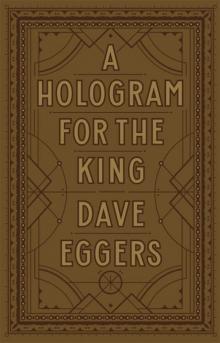 A Hologram for the King
A Hologram for the King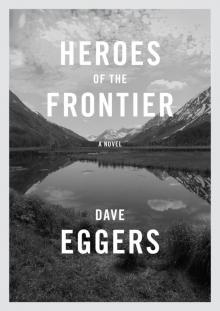 Heroes of the Frontier
Heroes of the Frontier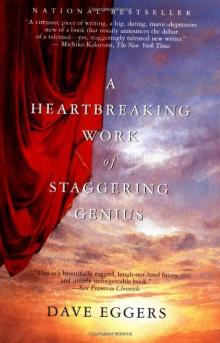 A Heartbreaking Work of Staggering Genius
A Heartbreaking Work of Staggering Genius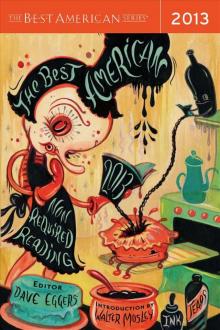 The Best American Nonrequired Reading 2013
The Best American Nonrequired Reading 2013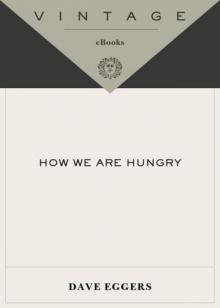 How We Are Hungry
How We Are Hungry The Circle
The Circle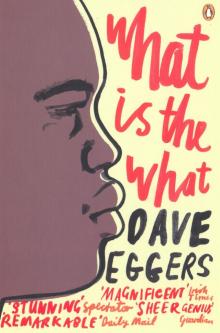 What is the What
What is the What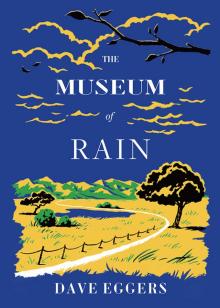 The Museum of Rain
The Museum of Rain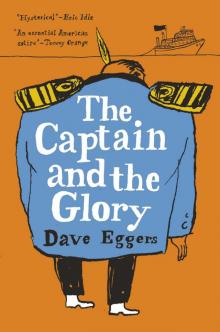 The Captain and the Glory
The Captain and the Glory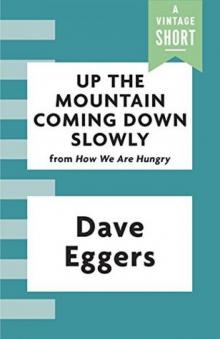 Up the Mountain Coming Down Slowly
Up the Mountain Coming Down Slowly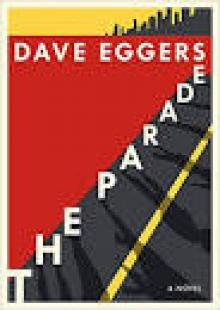 The Parade
The Parade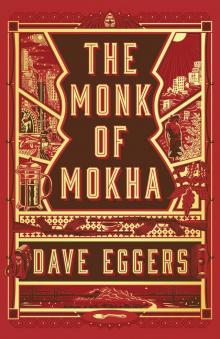 The Monk of Mokha
The Monk of Mokha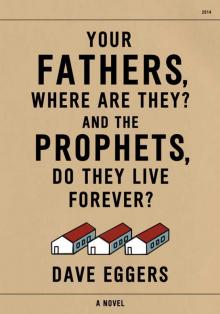 Your Fathers, Where Are They? And the Prophets, Do They Live Forever?
Your Fathers, Where Are They? And the Prophets, Do They Live Forever?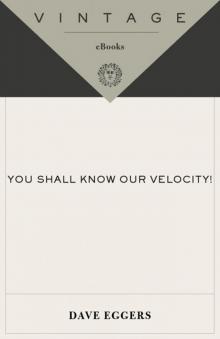 You Shall Know Our Velocity
You Shall Know Our Velocity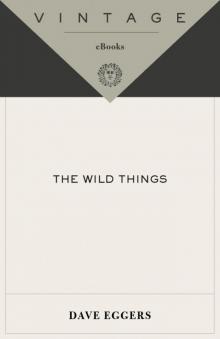 The Wild Things
The Wild Things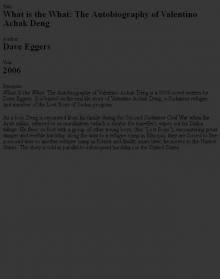 2006 - What is the What
2006 - What is the What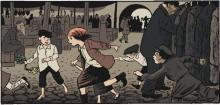 The Best American Nonrequired Reading 2011
The Best American Nonrequired Reading 2011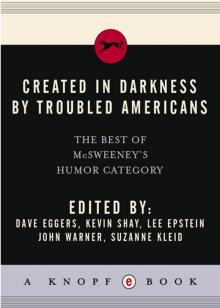 Created in Darkness by Troubled Americans
Created in Darkness by Troubled Americans